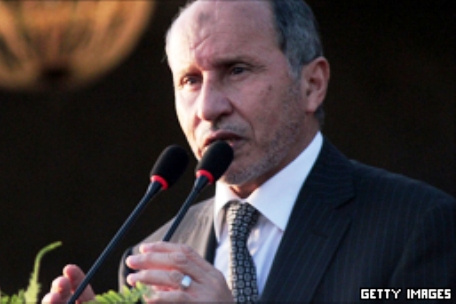For Libya, Resuming Ties with Iran May Not Be an Easy Task

Following the resignation of Mahmoud Jibril, the Libyan National Transitional Council (NTC) elected Abdul Rahim al-Keeb, an academic figure accepted by all political wings as the prime minister with a mission to establish the provisional government and to hold parliamentary elections. The new prime minister, the future of Libya and the prospect of Iran-Libya ties are reviewed in an interview with Javid Qorban-Oqli:
IRD: There were other choices for the chairmanship of the provisional government in Libya. How do you evaluate Abdul Rahim al-Keeb’s election to the position?
JQ: As you mentioned, several figures were suggested for the position, but the new decision-makers in Libya voted for Abdul Rahim al-Keeb to be the new prime minister. However, if any of other people was chosen, this question could be posed. But there was no way. The political bent of the new prime minister will become clear in future, since statesmen may adopt different positions based on the political conditions and balance of power. Who could have thought that Prime Minister al-Maliki would reach an agreement with Muqtada al-Sadr to remain the prime minister in Iraq? It all occurred due to their mutual interests. Therefore, we should wait to see how political groups interact with each other in Libya.
IRD: There are some news report of infighting among the revolutionaries and also their taking revenge on the Qaddafi supporters. Considering this, how do you evaluate the future of the country?
JQ: Predicting the upcoming changes in Libya is difficult due to the international forces’ involvement, the unquestionable role of NATO forces in toppling Gaddafi, the prolonged process of ousting Gaddafi from power, and the social and political circumstances of the country. You should know that Libya is a tribally-structured country, with underdeveloped social and cultural institutions. Political development and democratic institutions are non-existing, as Qaddafi established a unique type of governance in the country during his nearly half-a-century rule.
The future of Libya depends on what share of the power cake is claimed by the domestic forces (the jihadi forces and the politicians) and foreign powers (NATO, the US etc.), which all played some role in the overthrow of Qaddafi. The geographical situation of the country and its large oil reserves are decisive factors in the determination of Libya’s political future. Adding the lack of parties or groups capable of mobilization and organization of citizens (such as the Muslim Brotherhood in Egypt or the Islamist party Ennahda in Tunisia) to these factors, the landscape of the country’s policy will be ambiguous, if not bleak.
What you pointed to in your question, that is, taking revenge on Qaddafi’s supporters and the news of their massive massacre -along with the historical conflict between Western Libya (Benghazi) and Eastern Libya (Tripoli)- generates a complicated situation. I think it is a very favorable opportunity for the international powers to direct the future of Libya based on their own interests.
IRD: Is the country prepared to establish a powerful democratic government?
JQ: As I said before, establishment of a powerful government based on democratic values is not possible. It is supposed that the provisional government provides the conditions for establishment of the Constituent Assembly and drafting the constitution. Human rights-oriented remarks by the provisional government’s prime minister are a far cry from the reality of Libyan social and cultural grounds. The West-educated elites will face many obstacles if they want to form a government which adheres to their approach.
IRD: Against the revolutionaries’ demand, announcing the end of its mission in Libya, NATO claimed that it would leave the country. Is that feasible?
JQ: I think contrary to the official request of the NTC for an extension of NATO's presence in Libya for at least another month, Western governments played their cards skillfully. You may know that NATO’s record in the last seven months of military operation in Libya was totally against the framework approved by the UN Security Council in Resolution 1973. It was supposed that NATO would establish a no-fly zone in Libya in order to protect the Libyan citizens against Qaddafi forces’ attack; but in practice, it turned into a full-scale war; NATO trained and organized the opposition forces and extended its air attacks to all military and non-military installations.
To deflect the charges against it regarding its illegitimate function, NATO has decided not to extend its mission in the country and to withdraw its forces despite the NTC’s demand, in order to convince global public opinion that it followed a humanitarian cause.
IRD: Mr. Salehi visited Libya last week, meeting NTC officials. How do you predict Iran-Libya relations in the future?
JQ: Iran’s relations with the countries who underwent popular uprising and regime changes faces challenges. The first reason could be the totally different attitudes of the two sides, regarding the nature of the movements and the role and effect of the regional and international powers in the countries’ decision to improve relations with Iran. Nine months have passed since the overthrow of Husni Mubarak and in spite of extensive attempts to normalize relations with Egypt, no positive changes have occurred. The same is true about Tunisia, with some differences. In Libya, the situation could be harder for Iran, since contrary to public propaganda, Iran held good relations with the Qaddafi regime and their only bone of contention was fate of Imam Musa al-Sadr, rumored to be either imprisoned or killed in Libya. This could not be resolved, unless the two sides reach a settlement which places the indictment on Qaddafi. I would also like to point out that since the appointment of the new prime minister in Libya, Iran’s state-run media began launched attacks against what they call the “appropriation” of the Libyan revolution by the West-oriented and West-supporting forces. In the current atmosphere, there is no chance for the success of Mr. Salehi’s diplomacy.

